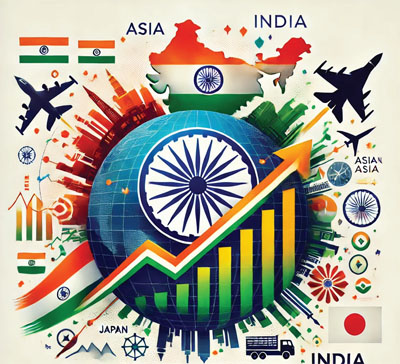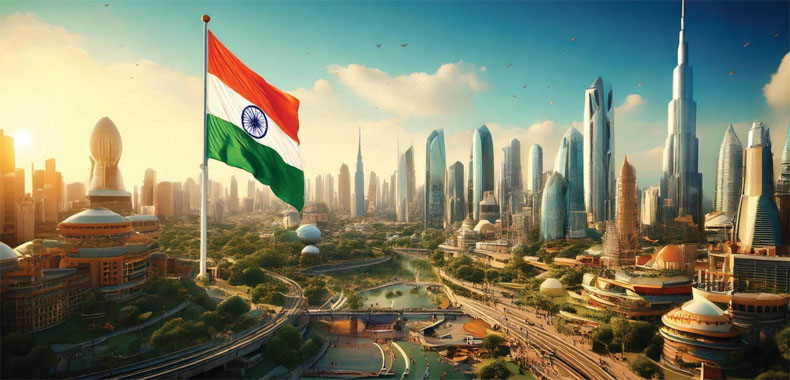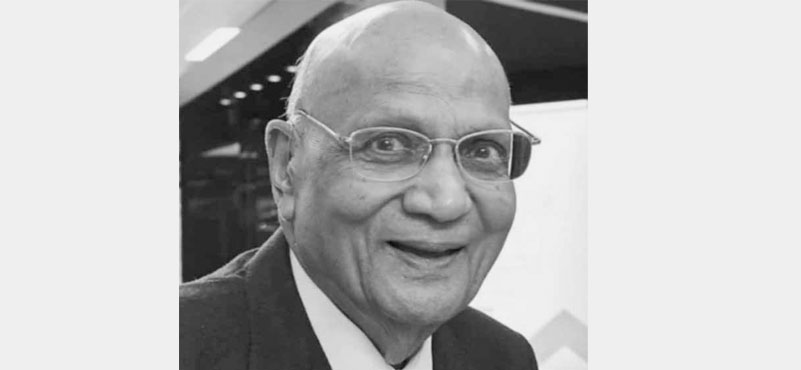India has landed on the moon, put an Indian on the International Space Station and has shown presence at the Mars. India is being watched by the world with a very keen interest as also with caution – as her GDP rises. Concurrently, the world is undergoing a rapid transformation, even turmoil — wars, shifting power structures, tech disruptions, and climate volatility. India stands at the eye of this storm not as a bystander, but as a consequential global actor. India, is no more isolated by terrain and distance – It is on the centre stage that the world looks at. On this Independence Day, as I stand to honour the tricolour and the spirit of our great republic, one thought rises above all — How India should be prepared, be resolute, and future-ready ?
 Recently conducted Operation Sindoor has put India once again on the crystal of judgement – nearly hyphenating her with Pakistan. There is also a sudden shift in alignments with US putting its bet on Pakistan – once rejected as a terrorist / failing state. In the recent times our relationship with most neighbours and relevant global players as well has become hazy and certainly lesser than desirable. Recent trends in the Maldives suggest a big welcome change. Patience and perseverance have paid. This could also become a signal of greater trust between the South Asian neighbours in the months to come. All the more, with big power rivalries playing out, we do not control all before us! India today stands at a decisive crossroads — facing complex geopolitical challenges, shifting global alliances, economic compulsions, and growing national aspirations.
Recently conducted Operation Sindoor has put India once again on the crystal of judgement – nearly hyphenating her with Pakistan. There is also a sudden shift in alignments with US putting its bet on Pakistan – once rejected as a terrorist / failing state. In the recent times our relationship with most neighbours and relevant global players as well has become hazy and certainly lesser than desirable. Recent trends in the Maldives suggest a big welcome change. Patience and perseverance have paid. This could also become a signal of greater trust between the South Asian neighbours in the months to come. All the more, with big power rivalries playing out, we do not control all before us! India today stands at a decisive crossroads — facing complex geopolitical challenges, shifting global alliances, economic compulsions, and growing national aspirations.
As a rising power with immense demographic, technological, and strategic potential, India can no longer afford a reactive posture to external threats or emerging disruptions. Op Sindoor became a compulsion for India to react to a situation for which seemingly the ‘die was cast’. This short operation serves as a window giving us a peep into the times to come in the near future. Considering the dynamics, moment has come for India to assert itself positively and confidently, both in word and deed, across diplomacy, statecraft, and military preparedness.

The global churning is unmistakable. The Russia-Ukraine conflict continues to reshape European security. The Israel-Hamas-Iran axis has thrown the Middle East into new uncertainty. The Indo-Pacific is increasingly militarised, with China’s assertiveness threatening peace and sovereignty. The new Cold War is no longer ideological but techno-strategic — fought in satellites, cyberspace, and microchips. Energy, data, space, and water are becoming theatres of power struggle.
Historically, India’s response to adversarial moves has often been measured, restrained, and reactive. While such a stance may have served the purpose of strategic patience, it has also allowed adversaries to set the narrative and the pace of escalation. India must now transition from this reactive framework to a doctrine of positive assertion—proactive, firm, and future-ready decision-making that aligns national intent with action.
 Nationally, Bharat is rising — but not as evenly as desirable. While economic growth is strong, social cohesion needs reinforcement. Digital India is leaping forward, but cyber threats loom large. Our young population is aspirational but anxious. India’s destiny cannot be left to chance; it must be crafted with strategic intent. Diplomacy is India’s strongest traditional instrument of influence, but it must now be supported with credible power projection. In an increasingly complex global order, diplomacy needs to be more cohesive and backed by strong statecraft with a resilient military posture. India must engage assertively in multilateral and regional forums, while simultaneously shaping coalitions of interest, especially in the Indo-Pacific, BRICS, and Global South narratives. Diplomacy must be used for making friends, partners and collaborators as also for agenda setting – going much beyond conflict management.
Nationally, Bharat is rising — but not as evenly as desirable. While economic growth is strong, social cohesion needs reinforcement. Digital India is leaping forward, but cyber threats loom large. Our young population is aspirational but anxious. India’s destiny cannot be left to chance; it must be crafted with strategic intent. Diplomacy is India’s strongest traditional instrument of influence, but it must now be supported with credible power projection. In an increasingly complex global order, diplomacy needs to be more cohesive and backed by strong statecraft with a resilient military posture. India must engage assertively in multilateral and regional forums, while simultaneously shaping coalitions of interest, especially in the Indo-Pacific, BRICS, and Global South narratives. Diplomacy must be used for making friends, partners and collaborators as also for agenda setting – going much beyond conflict management.
In terms of statecraft, the country needs to integrate economic, technological, and military tools into a seamless national strategy. The decision-making matrix must be swift, decisive, and forward-looking. The Indian strategic community must be capable of selecting its battles wisely, and not allow others to dictate the tempo. The key is to remain a step ahead in trajectory—militarily, diplomatically, and informationally.
This brings me to my greatest concern and greatest hope — the readiness of our Armed Forces. India cannot afford to be complacent in this age of hybrid, dirty, and grey-zone warfare. We must prepare our Armed Forces not just for conventional deterrence, but for cyber warfare, space-based defence, swarm drone attacks, and information operations. The future battlefields are silent, smart, and sudden. India must build a robust Military-Industrial Complex that integrates public and private sector innovation, supported by long-term policy certainty. From semiconductors to satellites, and from armoured vehicles to advanced missiles, self-reliance must become the bedrock of military preparedness.
India’s positive assertion is not about aggression; it is about readiness, confidence, and sovereignty. It is about ensuring that the nation is never caught off-guard, diplomatically outpaced, or militarily dependent. A synergised approach between diplomacy, military, and industry will secure India’s strategic autonomy and global standing. On this 15 August 2025, my hope is strong and my belief is firm — that India will not just navigate the global churn, but emerge stronger from it. This Independence Day is not just a celebration of freedom, but a commitment to preserving it, defending it, and elevating it.
Lt Gen PJS Pannu, PVSM, AVSM, VSM (Retd) was the former Deputy Chief Indian Integrated Defence Staff (Operations).








